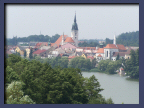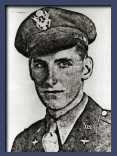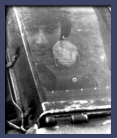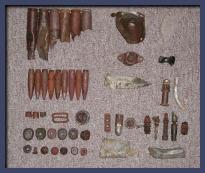Jiri Sasek
| Jiri
Sasek Czech Republic |
 |
My name is Jiri Sasek and I am working to open a museum in Jindrichuv Hradec, Bohemia in the Czech Republic.
As soon as the museum is open (circa 2008), I'll mail photos of the show cases dedicated to the bombers of the 464th BG.
This is the results of my research into the events of 24 August 1944 when the Fifteenth USAAF attacked targets in Czechoslovakia.
There were 368 bombers sent to oil refineries at Pardubice (55th Bomb Wing), Kolin (304th Bomb Wing) and the airfield in Pardubice (5th Bomb Wing).
German pilots were alarmed.
Jag Divison sent to the air five FW-190A-8/R2s from IV (Sturm)/JG. 3 (Götzendorf airfield) and nine FW-190A-8/R2s from II.(Sturm)/JG 300 (Seyring).
Cover was made by twelve BF-109s from I./ JG 302 (Götzendorf), fifteen BF-109s from II./ JG 27 (Fels am Wagram), four BF-109s from I./JG 300 (Seyring) and a few BF-109s from III./JG 300 (Seyring).
At 12:40, German fighters saw the first enemy planes over the Czech Republic near Jindrichuv Hradec. Pilots of II./JG 27 immediately joined the battle with American fighters. The box of 25 bombers from the 464th BG attacked the remaining German planes.

John H. James (776)
B-24 (H), Little Lulu no. 42-52479 (Red J, 776th BS) piloted by 1st Lt. John H. James was shot down by Uffz. Willi Reschke (1./JG 302) in cooperation with Fw. Hubert Engst (6./JG 300). The plane crashed near Vlcice, Czech Republic.

German pilot, Hubert Engst
(6./JG 300) in the cockpit of his
FW-190A-8/R2
The only survivor of this crew was the Radio Operator, John F. D'Amore.
D'Amore recalls, "On August the 24th, after succesfully dropping our bombs on the target we were starting on our way back when we were attacked by several ME-109 fighter planes. As the radio operator my battle position was the left waist gun, the attack came from the right side and also from the rear."
"Six 20 mm shells came into the fuselage about six inches from my toes, then the ship went into a flat spin. I was thrown to the floor and pinned there due to the centrifical force of the spin."

Artifacts from B-24 Little Lulu, serial no. 42-52479.
"Then the ship exploded and broke into several parts, leaving me in the rear section and 1st Lt. James in the front part. As soon as my parachute opened I hit the ground and I never saw any member of the crew from then on.
"It is my belief that a shell exploded in the front of the plane and killed everyone up there, thus causing the flat spin, for I know that if 1st Lt. James was alive he would have recovered from the spin."
"To me and the crew he was the best pilot in the world. I only knew 1st Lt. James for four months, but in that length of time I got to know him as a good officer, a good pilot, and a good sport - a combination very seldom encountered in this army. I feel as if I lost nine brothers. Every night I say a prayer for them."
B-24 (G), Little Gismo II, no. 42-78376 (776th BS) piloted by 1st Lt. Virgil A. Leverett exploded in mid-air after heavy damages by the Fockewulfs of II. (Sturm)/JG 300 over Cimer (Czech Republic). The wreckage crashed directly on Cimer killing two crewmembers and grand dame, Sophie Bohm (92).
B-24 (H), Black Hall, no. 42-51083 (779th BS) came near Gross-Gerungs (Austria) with a burning right wing. Shortly after, the pilot 1st Lt. Kermit F. Dannehl gave the order to bail out. The plane crashed near Kehrbach, close to Gross-Gerungs. Two men were killed-in-action.
B-24 Red-O, no. 42-52520 (776th BS), flown by 1st Lt. Thomas N. Vague's crew was heavily damaged over Jinrichuv Hradec and lost altitude. The plane crashed near Klagenfurt, Austria. Seven men managed to survive, but the other three were killed.
B-24 (J), Journey’s End, no. 42-78437, (Black K, 779th BS) piloted by 1st Lt. Joyce W. Lewis recovered first from the German attack over Jinrichuv Hradec and with serious damage headed back to the south.
During the battle T/Sgt. William F. Wrinn and four injured crew members bailed out. The plane landed late that afternoon on the base in Bari. T/Sgt. Richard L. Du Pre died of his wounds.
All 10 men were awarded the Silver Star medal.
But not only American losses were in this battle. About 6 FW-190s and 4 BF-109s were shot down by the American gunners' defensive fire.
Sincerely, Jiri Sasek
